End of our live updatespublished at 10:30 BST 27 September 2024
Our live coverage has ended.
For more updates on the closure of Ratcliffe-on-Soar power station, visit the BBC News website.
Ratcliffe-on-Soar power station - the UK's last coal-fired power station - will shut next week
Since 1967, it has produced enough energy to make more than one billion cups of tea per day
The power station employs about 350 people from Uniper, which runs the site
The site has been a landmark of the East Midlands for decades
Plant manager speaks of "tremendous pride" in what has been delivered
Decommissioning will begin immediately after the closure, and it is expected to take two years
Edited by Rebecca Sherdley
Our live coverage has ended.
For more updates on the closure of Ratcliffe-on-Soar power station, visit the BBC News website.
Matt Taylor
BBC News
Residents who live near to the site have discussed the impact of the power station on their lives with BBC East Midlands Today.
Lyn Shawcroft said: "I think quite a few people will be disappointed, because we have art students sketching and photographing quite frequently, the sort of architectural side of things."
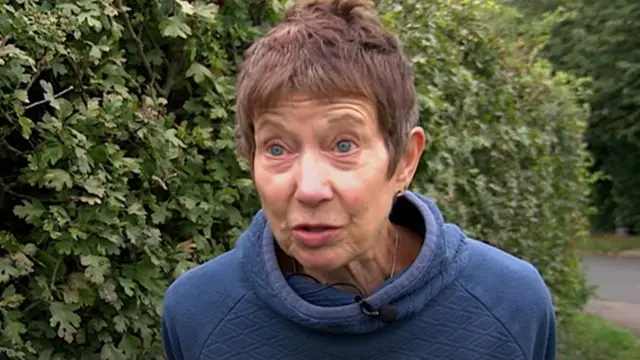
Raymond State, Ratcliffe-on-Soar parish treasurer, said: "When we’ve been away either going south or north, we can see the power station from quite a way off.
"Then we are quite pleased because we know we are near home."
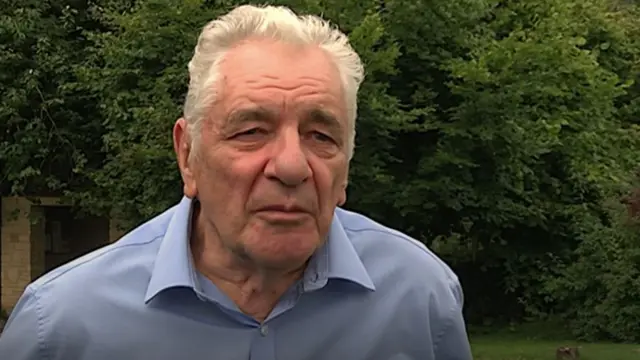
Matt Taylor
BBC News
The site has been of interest to photographers and artists over the years.
Christopher Furlong has photographed the site on multiple occasions.
He captured a coal stockpile waiting to be used in July 2023.
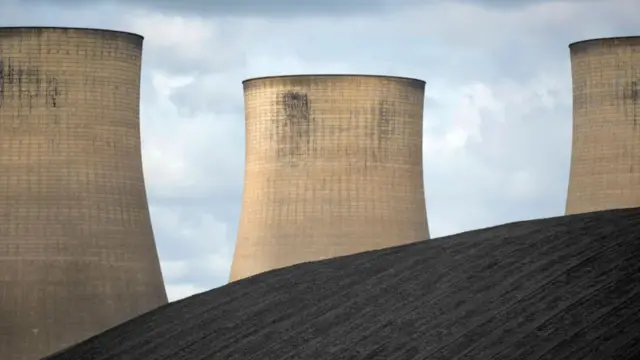 Image source, Christopher Furlong/Getty Images
Image source, Christopher Furlong/Getty ImagesMr Furlong pictured narrowboats waiting for renovation in a marina yard next to the power station on 19 September.
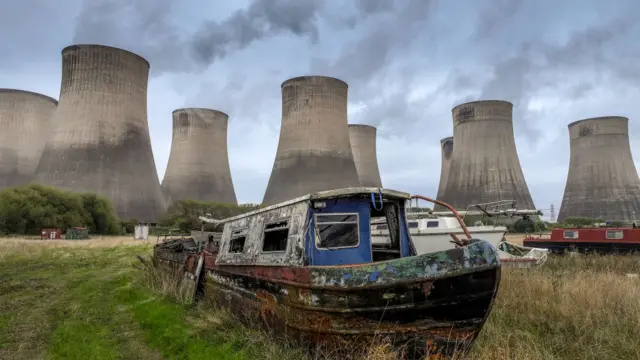 Image source, Christopher Furlong/Getty Images
Image source, Christopher Furlong/Getty ImagesAnd he took this aerial shot of the station, showing the eight towers emitting steam, also on 19 September.
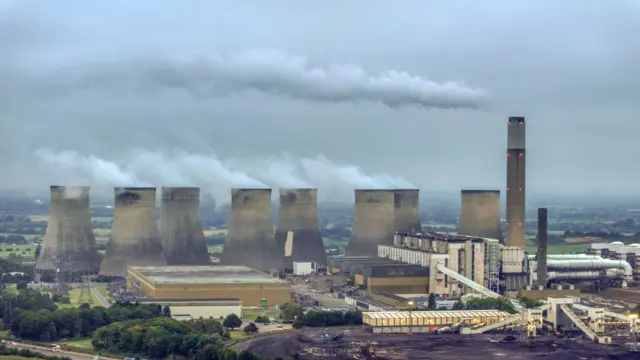 Image source, Christopher Furlong/Getty Images
Image source, Christopher Furlong/Getty ImagesMatt Taylor
BBC News
Mike Lewis, CEO of the site's owner Uniper, told BBC Breakfast that the power station's closure is a "tremendously important milestone in the global route to decarbonisation".
He confirmed that a clean energy technology park was planned on the site.
"There’s a local development order, and we’ve been working with stakeholders over the last few years to get that in place," Mr Lewis said. "So that we can see mixed industrial development here.
"Some of which is energy-related, some of which is advanced manufacturing and research and development, but all of it is around zero carbon and the journey to net-zero."
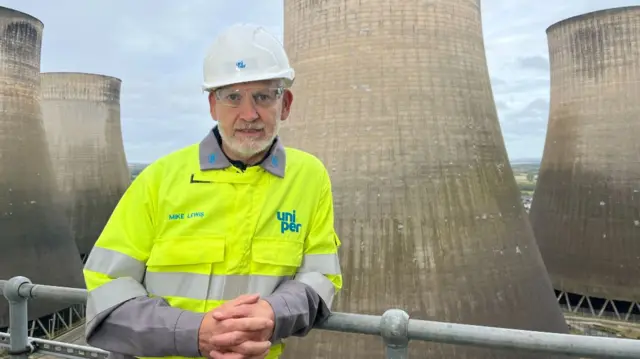
When asked if a future with clean energy and no blackouts is possible, he said "absolutely", adding that solutions are being worked on now.
Mr Lewis said: "What we want to do is decarbonise flexible generation, because you can't run an energy system on renewables alone.
"You need power when the sun doesn't shine and when the wind doesn't blow."
Matt Taylor
BBC News
Tom Oakley
BBC East Midlands
In June, the final delivery of coal arrived here by train – on a locomotive that was named in tribute to Ratcliffe.
All that's left now is 3.25 KT (thousand tonnes). Staff tell me that's enough for engineers to carry out two more "runs" before coal production on the site ends next week.
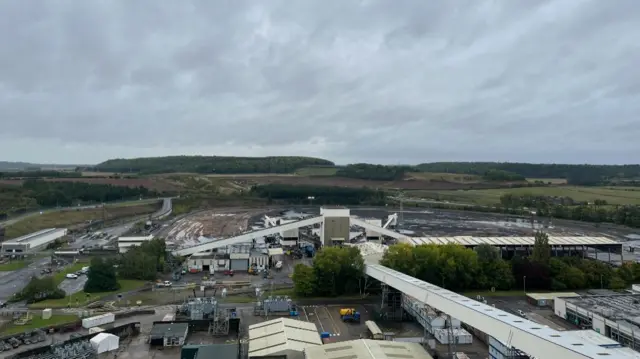
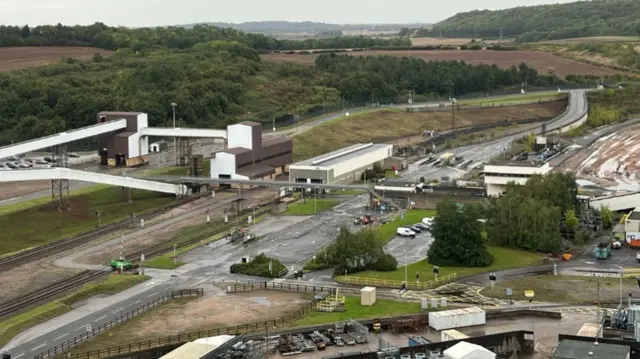
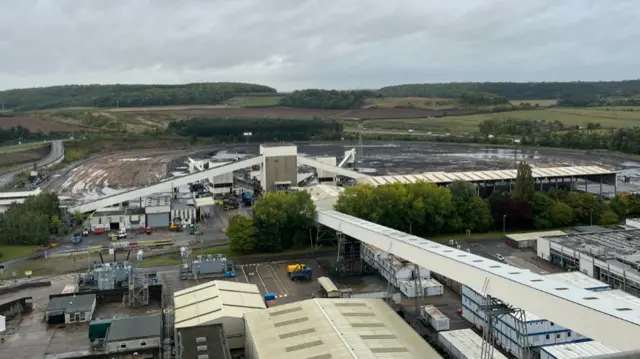
Tom Oakley
BBC East Midlands
In the control room at the power station – where no photographs are allowed for security reasons – there are two circles of staffed work stations facing large screens.
The whole plant can be controlled and monitored from here, and staff call it the “heart” of the site.
This space has seen “colossal change” during the life of the plant, Mr O’Grady tells me.
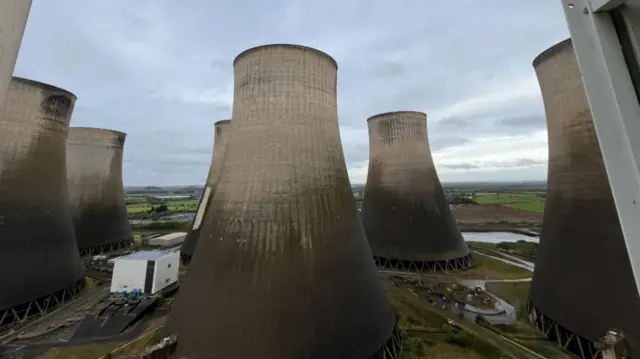
He said: "The whole site can be controlled and monitored from there.
"That's manned 24/7, 365 days a year. That will continue into decommissioning because we've still got a lot of services we'll be running.
"The control room has seen a huge amount of change over the years. It's currently very modern but originally it was all metal panels, and dials and knobs, meters and indicators."
Matt Taylor
BBC News
Richard Montgomery, electrical engineer at the station, said: “The emotions are building as we’re getting closer to 30 September.
"We’ve seen the coal going and there’s no more coming in."
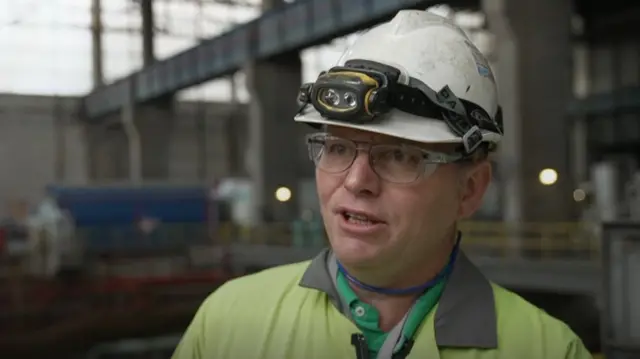
Chris Smith (pictured below), environment team leader, said: “I think it’s just a shame that the power station is having to close.
"We’ve worked so hard to make it the cleanest, but obviously, given the age of the plant, it’s probably about right for us to close and make room for more renewable energy.”
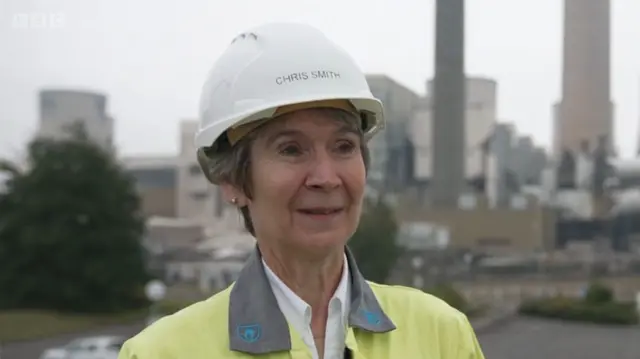
Matt Taylor
BBC News
Mr O'Grady told BBC Breakfast that the next steps on the site will be to remove and fuels, chemicals and gases, so the station is ready for demolition.
He said: “It is a huge site and we’ve been working for a number of years with the local region and stakeholders.
“We won’t need the full area of the site, as an energy company, so there’s opportunity for other investment within the region.
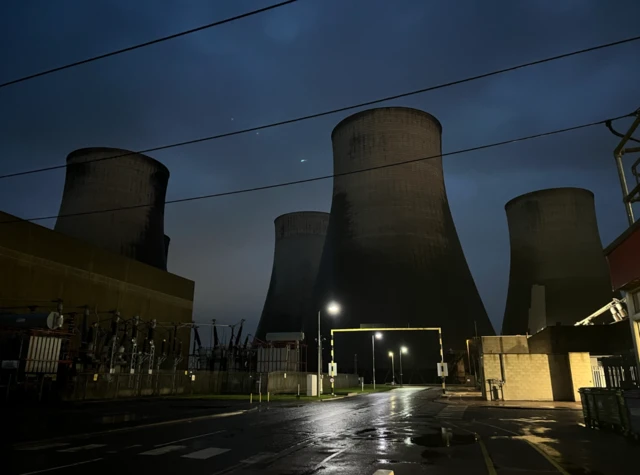
“This is Ratcliffe. There’s always a sense of optimism here.
"We’re in a position here where, yes, everybody’s proud of the role that we’ve played, but we’re now looking forward to what we can do for the future.
"So in terms of decommissioning, we don’t see that as ending, we see that as creating a new future.”
Tom Oakley
BBC East Midlands
Several months back, the power station's final order of coal arrived by rail, and a locomotive was renamed to mark the occasion.
GB Railfreight (GBRf) named one of its locomotives "Ratcliffe Power Station" ahead of its delivery of 1,650 tonnes of coal in June.
The final delivery of fuel was enough to generate power for approximately 500,000 homes over eight hours.
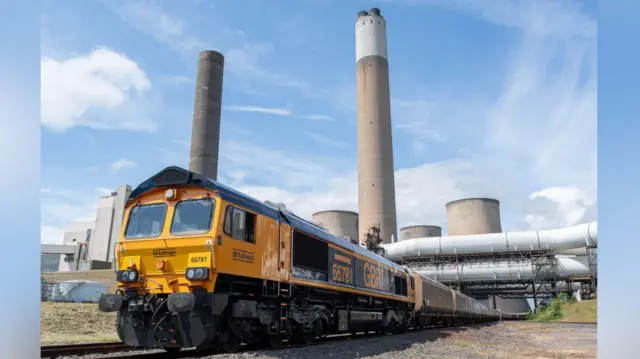 Image source, Supplied
Image source, SuppliedMike Lockett, of Uniper, which operates the station, said at the time: "[This] is a significant moment and one that heralds the end of the story for the power station.
"However, it's not the end for the site as we look towards a future where it could become a zero-carbon technology and energy hub for the East Midlands."
Tom Oakley
BBC East Midlands
Mr O'Grady, from Lincoln, who joined the industry in 1988, said there would be "a little bit of a celebration" on Tuesday as operations at the site ended.
"It’s a major thing – this is the end of coal-fire generation in the UK," he said.
“When I started in the industry, 80% of the UK’s power was from coal, and by the end of next week it will be zero and the lights have stayed on."
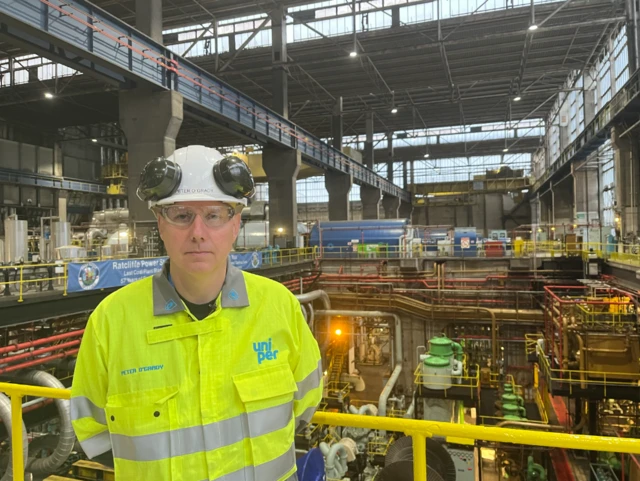
He described the turbine hall as "a fantastic space".
“We have four turbines, and I think anybody who comes in here is struck by the size and dimensions and complexity of all the pipework and systems that are all connected and play their part in making the generator turn at 3,000 revs per minute and producing up to 500 megawatts," Mr O'Grady added.
Matt Taylor
BBC News
Mary Weston-Webb, from Redhill Marina, is one of the closest residents to the cooling towers.
She told the BBC: "It does seem silly to be attached to it but it will be very sad when it goes.
"We did used to get black spots on the washing when we were hanging it out, and black spots on the car roofs that were acid.
"It was a concern, but they have spent quite a lot of money, I believe, and put all that right, so it wasn't a problem."
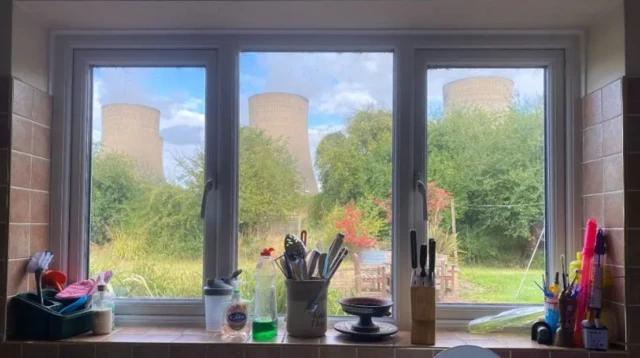
Matt Taylor
BBC News
Peter O'Grady, plant manager, told BBC Breakfast that some workers have been at the station for up to 47 years.
He said: "It's a huge step in their lives.
"On the other hand, there's tremendous pride in what everybody has delivered here in terms of keeping the lights on and the role it's played over such a long time."
He said there had been "plenty of time to plan for this and consult with staff", as messaging about climate change and the impact of coal had been "well signposted by the government".
Mr O'Grady added: "We can clean dust. We can clean sulphur. We can clean dioxides with nitrogen. We can’t remove the carbon dioxide and that’s the reason why we’re closing."
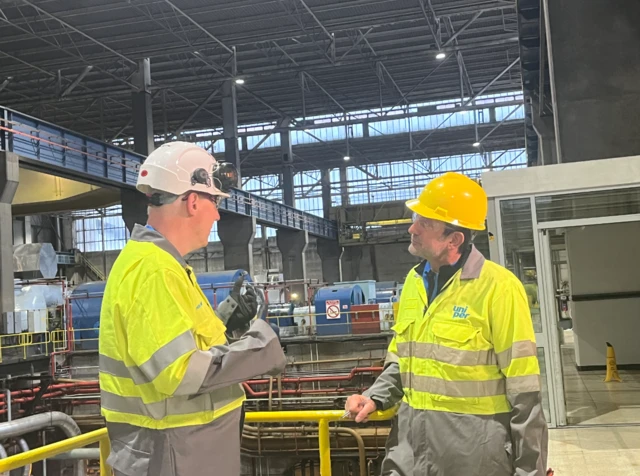
 Justin Rowlatt
Justin Rowlatt
Climate editor
The power station is right beside the M1, just south of Nottingham.
These mighty cooling towers have been a landmark in the East Midlands for decades.
They will be around for the next couple of years but they are slated for demolition - they're going to be blown up. In fact the whole site is going to be cleared to be replaced with a zero-carbon energy and technology park.
New industries, new jobs for the East Midlands.
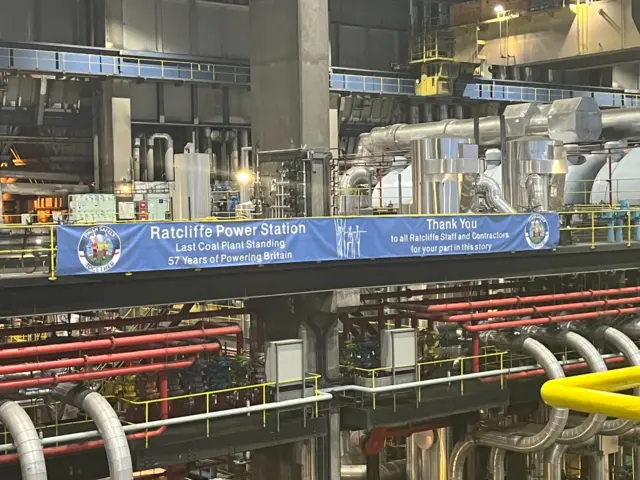
Tom Oakley
BBC East Midlands
Coal once dominated many areas of the country, particularly in the East Midlands, but the last coal mines have been shut for some time.
At the turn of the 20th Century, coal was used to generate more than 95% of the UK's energy, but last year it had fallen to 1%.
Coal is a fossil fuel and has been generating electricity in Great Britain since the Industrial Revolution, but it is now known to badly impact the environment.
When coal burns, it releases greenhouse gases, such as carbon dioxide, into the atmosphere.
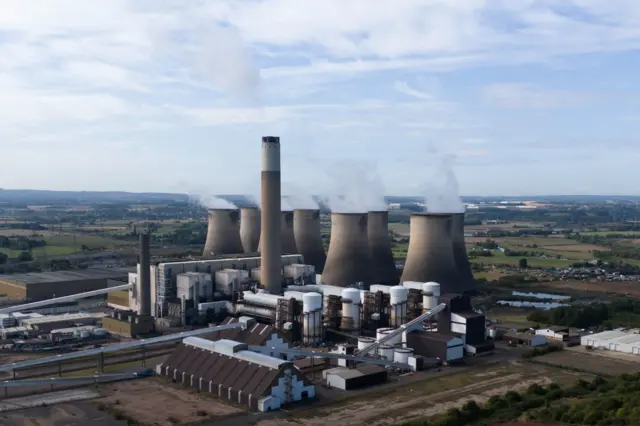 Image source, PA Media
Image source, PA MediaOver time, the build-up of greenhouse gases, which are released when coal is burned, has caused global temperatures to rise.
The UK has pledged to reduce its greenhouse gas emissions to net-zero by 2050.
To help achieve the UK's target of reducing its greenhouse gas emissions to net-zero by 2050, the government has committed to achieving fully "clean" electricity by 2035 through wind, solar, and nuclear power.
Tom Oakley
BBC East Midlands
Decommissioning of the plant in Ratcliffe will begin next week.
Once decommissioning is complete, the cooling towers and the rest of the 655-acre site will start to be demolished.
Elsewhere in Nottinghamshire, Cottam power station’s boiler house was demolished earlier this year after being decommissioned in 2019.
The moment part of the site was demolished was captured on camera, with people on social media saying they could feel and hear the demolition over a wide area.
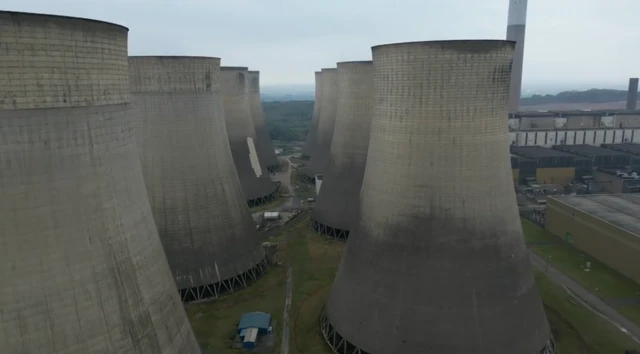
 Justin Rowlatt
Justin Rowlatt
Climate editor
The UK will be the first G7 member to completely phase coal out from its electricity mix.
I'm at the power station this morning.
You join me here at Ratcliffe-on-Soar's mighty turbine hall. Four giant turbines in here which can generate enough power for two million UK homes.
Coal has been the mainstay of UK electricity right from the beginning of the electricity era.
As recently as 2012, almost half of UK power came from coal, but that has changed dramatically.
Just yesterday, the government published some really quite surprising figures on renewable power. Renewable power generated in the three months to July - 52% of UK power. Now if you add in nuclear power, which is also low carbon, takes the figure up to 69%, which explains why coal-fired stations like this can now close.
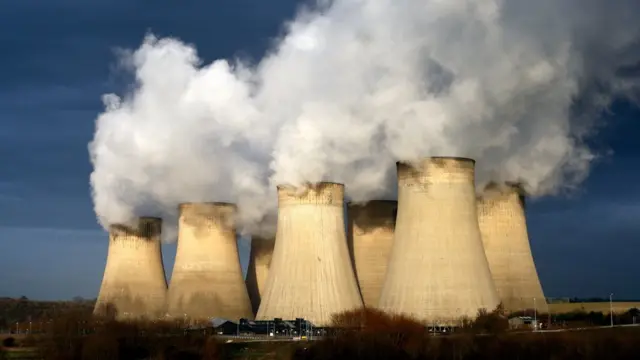
Tom Oakley
BBC East Midlands
I'm here inside the turbine hall where the electricity is generated. There are four units here at Ratcliffe that each generate more than 500 megawatts of electricity per unit.
Since 1967, they’ve produced enough energy to make more than one billion cups of tea per day and more than 21 trillion overall.
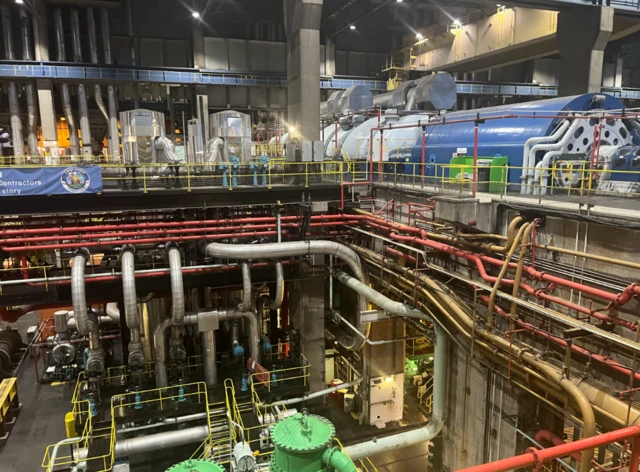
 Alex Smith
Alex Smith
BBC News Online
 Alex Smith
Alex Smith
BBC News Online
Ratcliffe-on-Soar, which has been generating electricity for more than half a century, stands as a sign of home to many living in the region.
For those living nearby, it has been both a landmark and direct influence on their lives.
The site will close on 30 September and decommissioning, which is set to take two years, will begin immediately after.
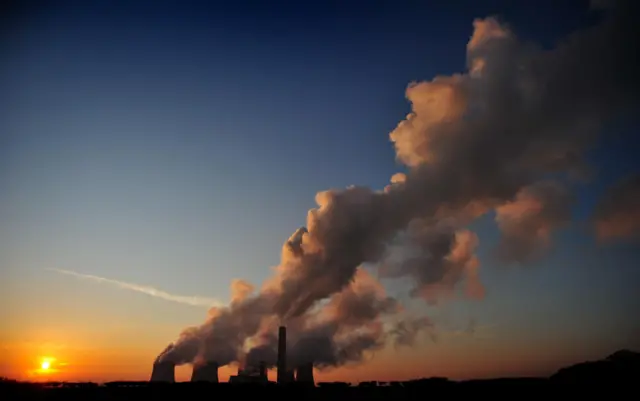 Image source, PA Media
Image source, PA Media